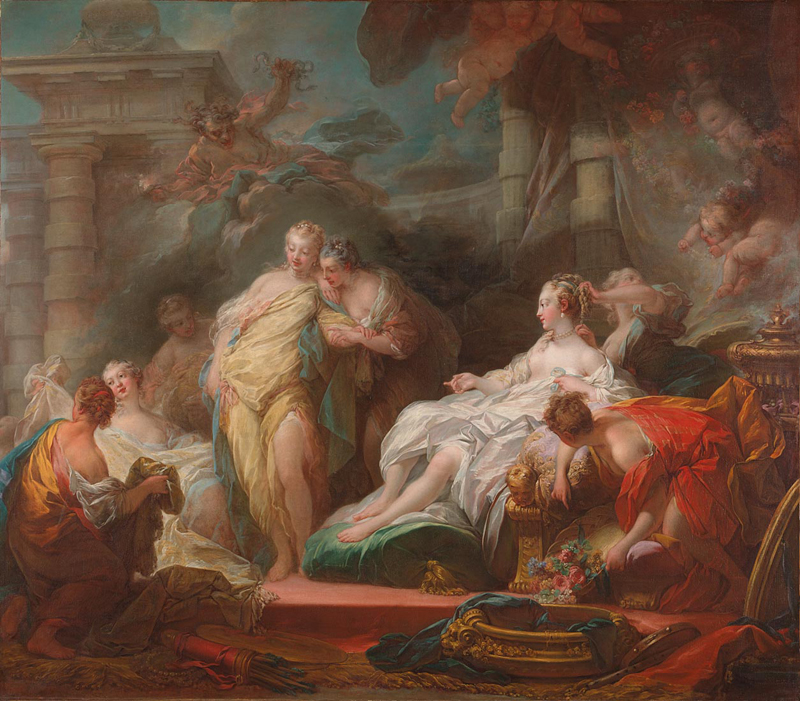
5.14
[1] Iugum sorōrium cōnspōnsae factiōnis nē parentibus quidem vīsīs rēctā dē nāvibus scopulum petunt illum praecipitī cum vēlōcitāte nec ventī ferentis oppertae praesentiam licentiōsā cum temeritāte prōsiliunt in altum. [2] Nec immemor Zephyrus rēgālis ēdictī, quamvīs invītus, susceptās eās gremiō spīrantis aurae solō reddidit. [3] At illae incūnctātae statim cōnfertō vestīgiō domum penetrant complexaeque praedam suam sorōris nōmen ēmentientēs thēnsaurumque penitus abditae fraudis vultū laetō tegentēs sīc adūlant: [4] “Psȳchē, nōn ita ut prīdem parvula, et ipsa iam māter es. Quantum, putās, bonī nōbīs in istā geris pērulā! Quantīs gaudiīs tōtam domum nostram hilarābis! [5] Ō nōs beātās quās īnfantis aureī nūtrīmenta laetābunt! Quī sī parentum, ut oportet, pulchritūdinī responderit, prōrsus Cupīdō nāscētur.”
Psȳchē’s sisters enter Cupid’s palace and feign happiness at Psȳchē’s fortunes.
iugum sorōrium: lit., “the sisterly yoke”
nē parentibus…vīsīs: ablative absolute.
cōnspōnsae factiōnis: “forming a pledged party” (Kenney ad loc.)
ferentis: Note the very Apuleian wordplay: when applied to the wind, ferens means “favorable” (as in Vergil, Aen. 4.430, ventōsque ferentīs), but here it’s also literally “carrying”. Ventī ferentis depends on praesentiam.
solō: from solum, -ī n.; indirect object of reddidit
incūnctātae: an Apuleian hapax (a word found only once in extant Latin), likely paying homage to Ovid’s use of in + perfect participle to form new words, particularly fitting given this text’s focus on metamorphoses.
cōnfertō vestīgiō: “in close order” (lit. “with dense footprint”). The term carries military connotations, perhaps alluding to the sisters’ deceptive strategy and/or in keeping with the military metaphors Cupid has been using.
pērulā: Its primary meaning of a “little wallet” (L&S) betrays the sisters’ ill-intent by framing their interest in fiduciary language.
Ō nōs beātās: acc. of exclamation; cp. Psȳchē in 5.1.5.
aureī: Likely wordplay on the child’s true father from Apuleius: golden epithets are given to Venus and Cupid in Virgil and Ovid.
cōnspondeō, -ēre, cōnspondī, consponsus: to promise mutually
rēctā (adv.): directly, straight on
opperior, opperīrī, oppertus sum: to await
prōsiliō, -īre, prōsiluī, prōsultus: to leap, jump off, rush
incūnctātus, -a, -um: undelaying
ēmentior, ēmentīrī, ēmentītus sum: to feign, lie, pretend
abdō, -ere, abdidī, abditus: to hide, render secret
adūlo, -āre, adūlāvi, adūlātus: to fawn upon
pērula, -ae f.: little wallet, by comic analogy, womb
hilarō, -āre: to gladden
nūtrīmentum, -ī n.: nourishment; by extension, rearing/ bringing up
